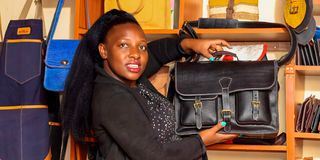How leap of faith into manufacturing turned into baptism by fire

Evelyne Karimi, 32, is the founder of Wika Leather, a venture that makes handcrafted leather goods such as bags, wallets and accessories.
When Evelyne Karimi started her business making handcrafted leather products, she spent the first month in school learning as much as she could about the enterprise. And she did so the next month and the month after that. She quickly discovered she had a lot of research to do and not much time as she had already spent her savings and pension to set up the business.
“I was working as an accountant when I quit to fully focus on business. We are often reminded to do market research before taking the leap but I didn’t. It was baptism by fire,” she reflects.
Karimi’s initial idea was to make her side hustle of selling bags her main gig since she had seen a huge demand in the market.
For five years, the 32-year-old had juggled her professional work with selling items such as bags and accessories.
“Everyone in the office, including the CEO, used to refer to me by my business name, Wika. It also fascinated them how I managed the two roles with ease. But, unknown to them, it was very demanding,” she says.
But soon after venturing into full time entrepreneurship she realised it was tough getting quality raw material for the bags and, the turnaround from suppliers was also slow.
“Further, the shipping companies kept changing terms to my disadvantage and a few of my customers were displeased with the ever-changing quality of the bags,” she offers. Then the Covid-19 pandemic struck, exacerbating her business's challenges as shipping delays plunged the venture into even deeper uncertainty.
“The idea of crafting leather goods from scratch sparked a revelation. It was a light bulb moment, spurred by the realisation that there existed a niche for meticulously crafted, high-quality leather products. I yearned for something quality and sustainable,” Karimi says.
She delved into extensive research and sought out established entrepreneurs in the industry.
“Fortunately, I found a mentor who guided me, imparting invaluable insights into the intricacies of the trade, from identifying reliable sources of top-notch leather to mastering the craftsmanship,” she recounts.
Power of social media
He allowed her to kickstart her journey from his workshop.
“In a remarkably short span, I garnered significant attention on social media. I even expanded my services to include custom engraving,” she remarks.
Last year, with the amount she received as her pension, she bought machines and set up a workshop. However, sourcing skilled labour was a daunting challenge.
“Even if I got one, how would I oversee a craft I had no prior knowledge of? This compelled me to use part of my savings to enroll for a three-month course to learn about design,” she offers.
Being in school, coupled with the demands of her family, caused her sales to plummet.
“At times, I found myself longing for the stability of regular employment. The added challenge of securing a skilled leather artisan left me in a tough place — equipped with the necessary tools and a workshop, yet lacking the skilled workforce needed to bring my vision to life,” she says.
Karimi eventually found her current employee, allowing her to resume taking on new orders. Her team has since grown with the addition of another staff member dedicated to marketing and expanding the reach of her business.
Today in her workshop nestled in Ruiru, customers casually drift in and out, some leaving with ready-made items, while others request for customized bags. This personalised service, she says, has been a pivotal factor in the upswing of her sales.
“It has been a journey filled with its fair share of ups and downs, but I'm elated that we've reached this point. There was a time when I doubted if I could cover rent, staff salaries and other expenses. Yet, one year in, I've consistently met all these financial obligations without delay,” she shares.
Belts
Her customers, she says, are mainly those in corporate, tours and travels and other small medium enterprises. “A wallet, for instance, starts at Sh2,500 and belts at Sh2,000. The bags also start at Sh2,500 but the price is dependent on the size, details and customisation requirements.”
In May, she took part in Google's Hustle Academy, a bootcamp-style training programme designed to help entrepreneurs increase revenue, position themselves for investment, and build sustainable businesses for the future.
“It was a one-week free boot camp and after, one is matched with a mentor. I learned a lot of things like doing marketing properly, how to use analytics to grow your business, creating content for social media, bookkeeping and how to get funders. I recently did a pitch to potential investors and I applied the knowledge gained in the boot camp. I think it’s very important for startups to take advantage of such opportunities for the growth of their businesses,” she offers.
Her vision is to tap into the international market and start a training academy for aspiring entrepreneurs interested in the industry.
“I currently have a mentee, and my aspiration is to impart my knowledge to as many individuals as possible, nurturing their passion for this business,” she asserts.





